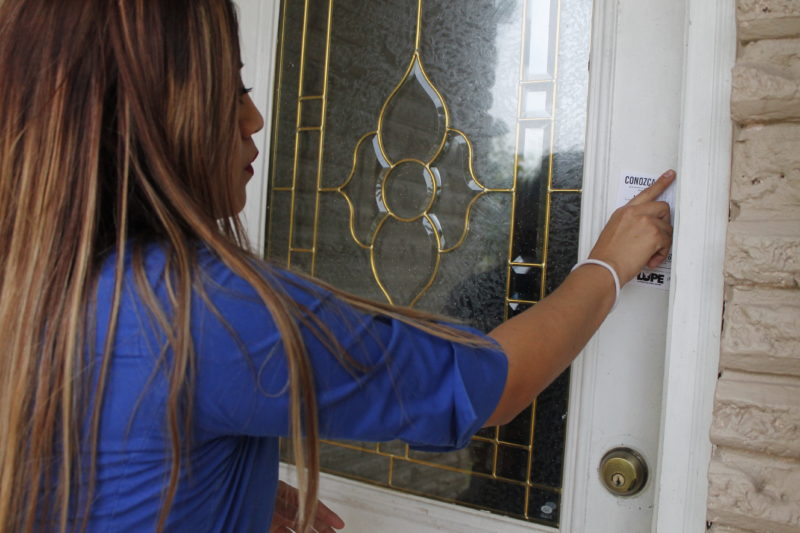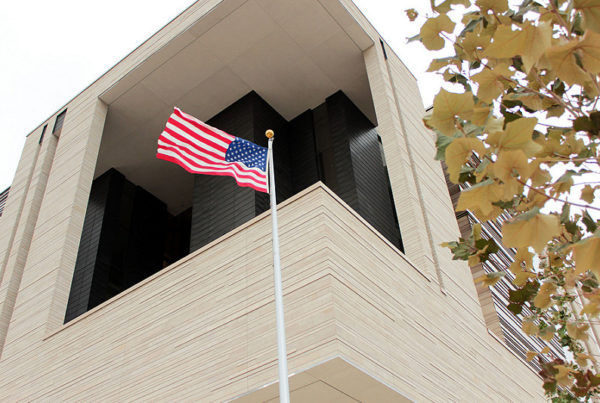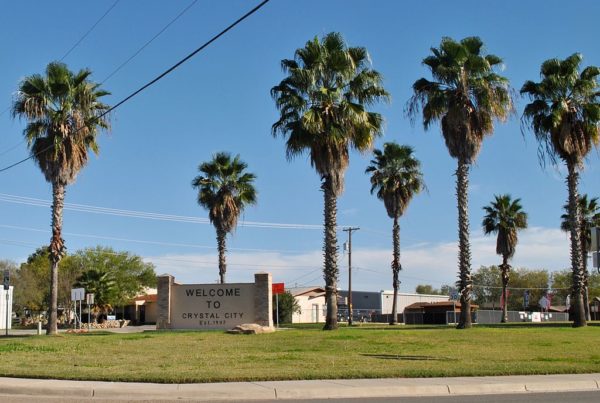Versions of who is being deported under the Trump administration vary.
“We’re getting gang members out, we’re getting drug lords out, we’re getting really bad dudes out of this country — and at a rate that nobody’s ever seen before,” President Donald Trump said last month.
But numerous reports indicate that people with no criminal records are being taken into custody and deported by Immigration and Customs Enforcement (ICE.)
These reports have sent fear through unauthorized immigrant communities.
In response a local organization in the Rio Grande Valley is going door-to-door, informing unauthorized immigrants about their rights when it comes to ICE.
Gabriela Zavala is knocking on doors in a predominantly immigrant neighborhood in Port Isabel in the Rio Grande Valley.
She’s with La Union Del Pueblo Entero, which translates roughly to ‘A Whole People United.’ The group is also known as LUPE.
Zavala is handing out flyers and answering questions about what people should do if they come into contact with Immigration and Customs Enforcement agents, or with local law enforcement. She says they’ve been doing this type of outreach once a week for the past month.
“If you notice I’ll be like ‘Buenos Dias!’ You know talking to them in Spanish. That way they know oh okay and so they’ll be confident to open, but we do see that a lot that people don’t want to come to the door. They’ll peak through the windows once they see that you’re from an organization, then they’ll be more confident with opening the door,” Zavala say.
She estimates that so far they’ve passed out more than 250 ‘Know your Rights’ flyers and talked to about 80 people.
With Zavala today is Julieta Paredes another volunteer. Paredes is 25. She grew up in this neighborhood and says she’s noticed a sense of fear steadily growing within the community.
“My mom, like three days ago, was telling me that a lot of families are moving out, like whole families are moving to Mexico,” she says.
It’s not just undocumented families, but also families with mixed immigration statuses who are leaving.
“That worries me because it’s not people who have lived here a year, or two, it’s people who have been here for more than fifteen years,” Paredes says.
Paredes herself is not a citizen. She started volunteering with LUPE after the group helped her fill out her Deferred Action for Childhood Arrivals (DACA) form Through that program, she’s been able to attend the University of Texas Rio Grande Valley. That’s in part why she’s so committed to the group’s vision of helping people – making sure citizens and non-citizens know their rights.
On this morning Zavala and Paredes meet an undocumented grandmother from a mixed status family. She didn’t want her real name used – she’s afraid of being identified and deported –so we’ll call her Norma. She is from Mexico, in her early sixties, and works at South Padre Island cleaning condos. She says ICE recently showed up in her neighborhood at around six in the morning and came to her door.
“I opened the door,” she says “and they showed me a photo. They said they were looking for this person.”
She told agents that person didn’t live there – that she didn’t know him and that she could only speak about her family.
Zavala tells Norma that it is her right to keep her door closed even if ICE agents are at the door. She has the right to not answer any of their questions, especially if agents don’t have a warrant.
Norma says later that day she heard ICE agents rounded-up seven people in her community. She hasn’t seen them since and that frightened her. Now she wakes up early every day to be on the lookout for more ICE agents. Whenever she hears a knock on the door she sends her teenage granddaughter, a U.S. citizen, to peek through the window and see who’s outside. Norma says her granddaughter has been taking all of this really hard. She’s been crying a lot, Norma says, especially when they go to church.
“I ask her why she’s crying,” she says. And her granddaughter answers it’s because she’s doesn’t want to go to Mexico. And that she’s afraid she’ll drown crossing the river. Norma tell her “But you don’t have to swim because you have papers.”
Norma doesn’t support President Trump or his administration’s increased focus on deportations but she believes God put him in office for a reason.
“You all don’t know how much I’ve cried,” she tells Zavala and and Paredes “but I know President Trump isn’t to blame. He didn’t go out there and bring me here.”
Norma says she has to pay a price for coming without documents. but knows God will take control of the governments. She quotes scripture “God puts kings in power and takes them out.” She says there’s hope in that verse.
Zavala and Parades leave Norma with a flyer and thank her for letting them into her home. They talk about possibly planning a meeting at her house, where other community members can also learn about their rights.














